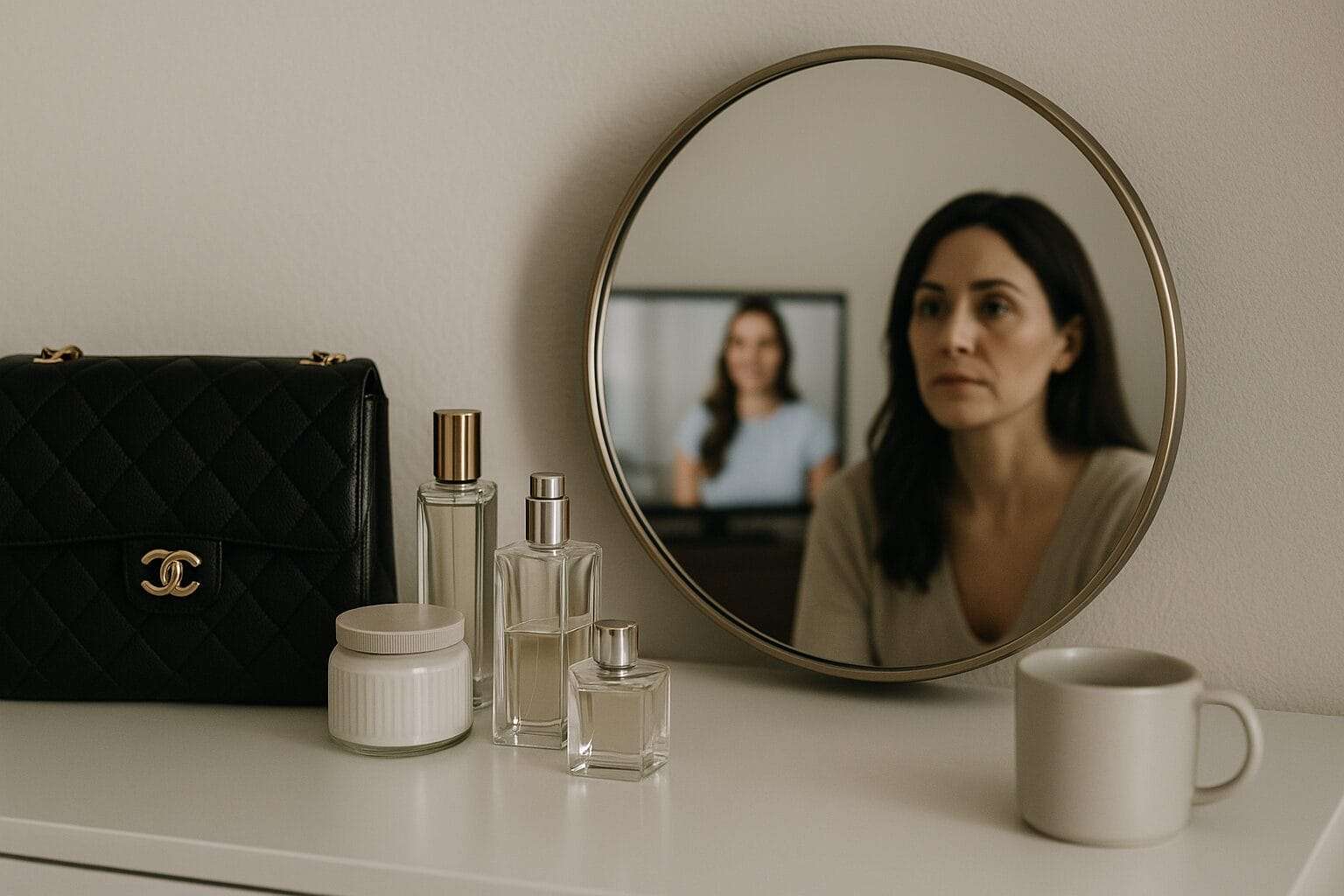- Updated: November 29, 2025
This isn’t just another hot take on influencer culture.
This is a warning for leaders who are drowning in aesthetic inspiration—and calling it ambition.
Because here’s the truth:
Lifestyle fantasy isn’t harmless. It’s corrosive.
It hijacks your focus, erodes your self-trust, and convinces you to perform a curated version of success while quietly burning out behind the scenes.
I didn’t plan to write this.
But after a Vegas field trip, a plane ride full of influencer-scroll, and a Wall Street Journal article drooling over Meghan Markle’s sweater—not her work, not her impact—I couldn’t unsee it.
Because something deeper is happening.
Smart, capable women—leaders—are stitching together borrowed aesthetics and calling it identity.
Not because they’re shallow.
But because they’re tired. Disoriented. Numb. And hoping a more beautiful life might feel like a more meaningful one.
I’m Denise G. Lee, a healing and leadership coach who works with high-performing people navigating burnout, emotional sabotage, and the pressure to hold it all together.
So if you’ve ever bought the candle, the course, or the curated desk setup hoping it might restore your sense of self—
We need to talk.
Because lifestyle fantasy doesn’t just waste your money.
It fractures your leadership.
What We're Unpacking
🧠 The Hidden Cost of Aesthetic Performance
You know what it looks like:
The clean desk. The perfect light. The cup of coffee placed just right.
But it’s not just content anymore.
It’s become currency.
In a world where presence has been replaced by polish, too many smart, driven women are quietly bleeding out behind a beautifully curated feed, a neutral-toned office, or a lifestyle that photographs well—but feels hollow.
Not because they’re shallow.
But because they’re tired.

Because when you’re overextended, under-supported, and living in a world that rewards aesthetic alignment more than emotional alignment—sometimes the quickest fix looks like the cleanest image.
I’m not writing this to bash influencers.
This isn’t about the algorithm.
This is about the leader—you—who’s lost track of her internal compass while trying to create a life that looks like it’s working.
The cost of aesthetic performance isn’t just financial.
It’s spiritual.
It’s what happens when success becomes a set piece.
When confidence gets conflated with consumption.
And when your leadership tone starts sounding more like your favorite podcast host than your actual self.
✨ You Didn’t Lose Yourself. You Got Hijacked
It didn’t happen overnight.
One scroll. One “must-have” list. One aspirational podcast that told you what morning routine equals success.
And slowly, without realizing it, you stopped hearing your own voice.
You outsourced your instincts to someone who felt more certain.
You started curating instead of connecting.
Not because you’re weak.
Because you’re human—and high-functioning humans are often the easiest to fool.

Especially when you’ve built an identity around having it together.
And here’s the most dangerous part:
The version of you that’s performing well?
She’s not a fraud.
She’s just fragmented.
She knows how to deliver.
She knows how to rise.
She just forgot how to listen to herself without needing it to look like a win.
Dr. Mark Johnson, a media studies professor, notes:
“These one-sided relationships create a sense of intimacy and trust. When an influencer recommends a product, it feels like advice from a friend rather than an advertisement. This blurs the line between genuine connection and marketing, making people more susceptible to influence.”
This is how it happens.
Not with a breakdown.
But with the slow, subtle loss of your own authority.
🔥 Why Nobody Wants to Call It What It Is
If lifestyle fantasy is so hollow, why hasn’t it collapsed?
Because it’s not just trendy.
It’s strategic.
It’s emotional marketing at its most sophisticated—and most profitable.
Let’s name the real reasons this illusion still holds power over smart, capable women:

💸 1. It Sells Because You Want to Believe
From $300 dresses to $1,400 “cozy” couches, the real product isn’t the item—it’s the illusion of arrival.
The dream is always:
“If I buy this, maybe I’ll feel like her. Calmer. Cleaner. More grounded.”
Calling that a fantasy threatens the whole marketing machine.
Because fantasy sells better than self-trust ever could.
🪞2. Admitting It’s Fake Feels Too Exposing
Deep down, most people know it’s curated. But if you call it fantasy, you’re forced to confront something uncomfortable:
You weren’t just watching—you were participating.
You were emotionally aroused by someone else’s filtered life.
You shaped your desires around their image.
And you used adult money to play pretend.
No one wants to admit that. So we rename it:
“Aspiration.”
“Vision boarding.”
“Just a little inspiration.”
📱3. It’s So Normal, We’ve Stopped Noticing
When everyone’s curating—branding, filtering, soft-launching their lifestyle—it stops looking fake. It becomes the standard.
We’ve aestheticized the mundane to the point where a cluttered desk or tired face feels wrong.
And when false becomes the norm, authenticity starts to feel like an interruption.
🤐 4. The Critics Are Complicit
Even the voices who could speak up—writers, podcasters, coaches—often depend on the same ecosystem they’d be critiquing.
They don’t wear Shein. They have better taste.
But the message is still:
“Follow me. I’ve figured life out. Here’s how you can too—for $49.99 or through these affiliate links.”
To call out the fantasy would mean dismantling the platform they built it on.
🎭 5. It Feels Like Inspiration—But It’s Just Another Form of Numbing
You think you’re being inspired.
You tell yourself it’s motivation.
But more often than not, it’s just prettier escapism.
And when you’re emotionally exhausted, the scroll hits like a sedative.
Not because it heals you—because it suspends you.
The real question isn’t whether you’re watching too much.
It’s this:
Are you consuming to expand your life…
or to distract yourself from the one you’re in?
When Kindness Clouds Clarity
Recently, I noticed myself getting drawn in by a very popular hair creator online. She spoke with such warmth and sincerity, and her tone made me feel like she was genuinely invested in helping people heal their relationship with their hair. But her entire feed was wall-to-wall heat styling — flat irons, Marcel combs, tension passes — while she insisted she personally only used heat every six to eight weeks. The visuals and the claims didn’t match. And for a moment, I felt that familiar tug: “Maybe I should trust her confidence more than my own instincts.”
That’s the trap.
Not manipulation — misalignment packaged as authority.

Influencers rarely deceive on purpose. Many are simply unaware of how their curated output contradicts their lived reality. But we’re the ones who pay the cost of the contradiction. And this time, I caught it. I felt the dissonance, named it, and stepped back. Not because she’s wrong — but because she isn’t aligned with my goals, my biology, or my wisdom.
🧍♀️ Real Leaders. Real Traps.
Let’s make this personal.
Here’s how lifestyle fantasy hijacks even the sharpest among us:

🧥 The $400 Sweater Spiral
Sarah, 35, Marketing Executive
“I bought that Jenni Kayne sweater Meghan wore. Told myself it was an investment piece. Truth? I was hoping it would make me feel elegant and put-together. Spoiler: I’m still me—just with less money in the bank.”
📱 The Influencer Upgrade Illusion
Tom, 28, Graphic Designer
“I followed this tech guy who had all the latest gear. Maxed out my credit card trying to keep up. I thought it would make me better at my job. Turns out, tools can’t replace skill—or self-worth.”
🧍♀️ The Mommy Blogger Mirror
Jenny, 42, Small Business Owner
“I obsessed over a lifestyle blogger who seemed to have it all. Perfect house, perfect wardrobe, perfect rhythm. One day I realized—I was mimicking her life instead of living my own.”
These aren’t just money regrets.
They’re signs of a deeper erosion—when leadership clarity gets blurred by emotional outsourcing.
And if that hit a little too close to home?
You’re not broken.
You’re just waking up.
In the next section, we’ll talk about what this kind of wake-up costs—and what it might finally set you free to reclaim.
💔 The Hidden Toll of Lifestyle Addiction
Let’s stop pretending it’s harmless.
Lifestyle fantasy isn’t just a bad shopping habit.
It’s a slow leak in your emotional authority.
Because the more you consume someone else’s life, the harder it becomes to lead your own.
You start second-guessing your rhythms.
You perform presence instead of feeling it.
You decorate your life like a set—and then wonder why it doesn’t feel like home.
And here’s the part no one talks about:
You can be fully functional and still deeply lost.

You can lead meetings, manage a team, raise a family—and still be disoriented inside your own life, performing a version of success that quietly exhausts you.
The cost isn’t just your money.
It’s your clarity.
Your voice.
Your emotional stamina.
And slowly, you stop trusting yourself.
Not because you failed—but because you fed your self-trust to the algorithm, one scroll at a time.
You don’t need a digital detox.
You need a soul reclamation.
Because this isn’t just about screens and influencers.
This is about the slow, seductive death of your own internal compass.
And here’s the good news:
Once you see it, you can’t unsee it.
And that means you can choose differently.
⛔ How to Reclaim Your Authority in a World That Profits Off Your Doubt
You don’t have to unsubscribe from every email list.
You don’t have to throw out the sweater or delete your Pinterest boards.
But you do have to stop pretending the fantasy didn’t change you.
Because it did.
It softened your boundaries.
It numbed your discernment.
It hijacked your clarity and dressed it up as “aspiration.”
But here’s the truth no one profits from saying:
You don’t need a prettier life.
You need a more honest one.
One you can lead from.
One that doesn’t crumble the moment you stop performing.
This isn’t about shame.
It’s about recovery.
From aesthetic addiction.
From emotional outsourcing.
From the myth that identity is something you can buy your way into.
You were never broken.
Just buried under someone else’s vision board.
It’s time to come home.
If you’re done outsourcing your confidence—and ready to rebuild something real—
💛 Work with me, Denise G. Lee – I help high-performing leaders untangle the emotional patterns beneath burnout, performance, and aesthetic addiction.
👉 Start your healing here
🎙️ Prefer to listen first?
My podcast shares honest, no-fluff conversations on emotional sobriety, trauma recovery, and leading with clarity.
👉 Explore the Introverted Entrepreneur
💌 Want to process this with someone who gets it?
I read every note. Seriously.
👉 Write me a message
And remember—
The world will always sell you a version of success that looks good in photos.
But leadership?
Real leadership?
Is built in the moments no one sees.
Choose that life.
Not the filtered one.


